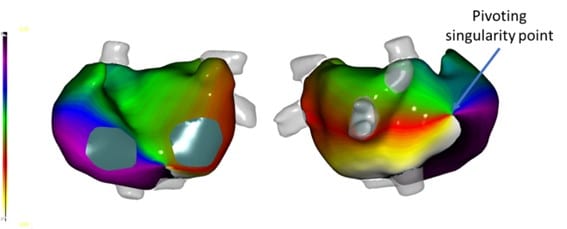- A new study from the Universitat Politecnica de Valencia (UPV) and Corify Care demonstrates the effectiveness of Electrocardiographic Imaging (ECGi) in detecting and diagnosing cardiac arrhythmias more accurately and planning treatment more efficiently.
- This breakthrough has the potential to make ECGi a routine tool in clinical practice, bringing the diagnosis and treatment of cardiac arrhythmias closer to patients.
For over a hundred years, the main way to diagnose a patient with cardiac arrhythmia has been using a standard electrocardiogram (ECG). This technique allows the detection of these pathologies, but with limited use in identifying the most appropriate treatment for each patient. Recently, a new technology has been developed, Electrocardiographic Imaging (ECGi) which allows the non-invasive mapping of the cardiac activity to without the need of surgery or catheters. Known as the “ECG of the 21st century”, it has a significant drawback: it requires the support of CT and ECGi scan, which restricts its use to highly complex patients and in leading centres worldwide only.
Now, a study from COR-Instituto ITACA research group from the Universitat Politècnica de València (UPV) and the start-up CorifyCare (https://pubmed.ncbi.nlm.nih.gov/36634462/) has opened a new way to help clinicians and make ECGi a routine clinical application tool. In their work, published in the Journal of Electrocardiology, they evaluated the possibilities of using ECGi without CT/MRI to detect atrial fibrillation, the most common cardiac arrhythmia. More than 1 million people in Spain suffer from this arrhythmia, and more than 40 million of the world population. This approach enables a quick real-time visual representation of the heart and its electrical activity.
The UPV and Corify Care team analysed the surface signals from 25 patients with atrial fibrillation and compared the effect of using ECGi with imaging techniques and their proposed ECGI with an estimated cardiac geometry based on the anatomical characteristics of the patient’s torso.
Their results validated non-imaging ECGi as a robust technique for the non-invasive assessment of atrial fibrillation, demonstrating that it can provide detailed information about the cardiac electrical activity in a much more comprehensive way than conventional ECGs. “This solution will help clinicians to detect and diagnose cardiac arrhythmias more accurately and to provide better and efficient therapeutic strategies for patients,” adds Dr Maria Guillem, a researcher in the COR-Instituto ITACA group at the Universitat Politècnica de València.
Rubén Molero, also a researcher with the COR-Instituto ITACA group, highlights that this technique not just reduces patients’ exposure to radiation and contrast agents such as CT scans but optimizes cost-efficacy treatments and the procedure time, “facilitating its implementation into clinical practice”.
Nowadays, this technology, patented before its publication, is starting the pre-commercial phases by the company Corify Care, granted with the European Innovation Award 2020 by the European Institute of Innovation and Technology.
As Andreu Climent, researcher of the study and CEO of the company, points out, “the ability to obtain maps of the electrical cardiac activity in a few minutes and safely allows to progress, both in atrial fibrillation and in many other arrhythmias, to increase the accuracy of invasive procedures”.
The study has been completed thanks to different projects funded by the Generalitat Valenciana Conselleria d’Educació, Investigació, Cultura i Esport, the Agencia Estatal de Investigación and the European Institute of Innovation and Technology in Health (EIT-Health).
